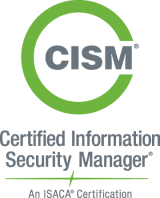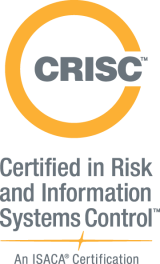Cybersecurity
Cybersecurity
CISSP is the most-esteemed cybersecurity certification in the world. It recognises information security leaders who understand cybersecurity strategies, as well as hands-on implementations. It shows that one has the knowledge and experience to design, develop and manage the overall security posture of an organisation.
Demonstrate your information security management expertise. The management-focused CISM certification is unique in promoting international security practices and recognising the individual who manages, designs, oversees and assesses an enterprise’s information security.

CRISC is the only certification that prepares and enables IT professionals for the unique challenges of IT and enterprise risk management, and positions them as strategic partners to the enterprise.

CGEIT recognises a wide range of professionals for their knowledge and application of enterprise IT governance principles and practices. As a CGEIT certified professional, one is capable of bringing IT governance into an organisation— grasping the complex subject holistically and therefore enhancing one’s value to the enterprise.

The CISA designation is a globally recognised certification for IS audit control, assurance and security professionals. Being CISA certified showcases your audit experience, skills and knowledge, and demonstrates you are capable to assess vulnerabilities, report on compliance and institute controls within the enterprise.

Learn the purpose, benefits, concepts, and vocabulary of DevSecOps; particularly how DevSecOps roles fit with a DevOps culture and organisation. At the end of this course, you will understand using security as code with the intent of making security and compliance consumable as a service.

Laws and Regulation
Under the Personal Data Protection Act 2012 (PDPA), organisations are required to develop and implement policies and practices that are necessary to meet its obligations under the PDPA. In particular, organisations are required to designate at least one individual, known as the data protection officer (DPO), to oversee the data protection responsibilities within the organisation and ensure compliance with the PDPA.
Under the Personal Data Protection Act 2012 (PDPA), organisations are required to develop and implement policies and practices that are necessary to meet its obligations under the PDPA. In particular, organisations are required to designate at least one individual, known as the data protection officer (DPO), to oversee the data protection responsibilities within the organisation and ensure compliance with the PDPA.
The course will provide a good overview and understanding of the PDPA and how it may be applied to the organisations for compliance. Areas covered in the training include key legislative and regulatory requirements of PDPA and compliance and alignment with PDPA, as well as prepares management report for follow-up.
The course will provide students a good overview and understanding of the Cybersecurity Act and how it applies to organisations for their compliance. Areas covered in the training include main objectives of the Cybersecurity Act, its key legislative provisions and how it affects organisations. The course also explains how learners can help ensure compliance with the Cybersecurity Act, as well as how to prepare a management report for follow-up.
The CCSK certificate is widely recognized as the standard of expertise for cloud security and provides you with the foundations you need to secure data in the cloud. How you choose to build on that knowledge is your choice.









